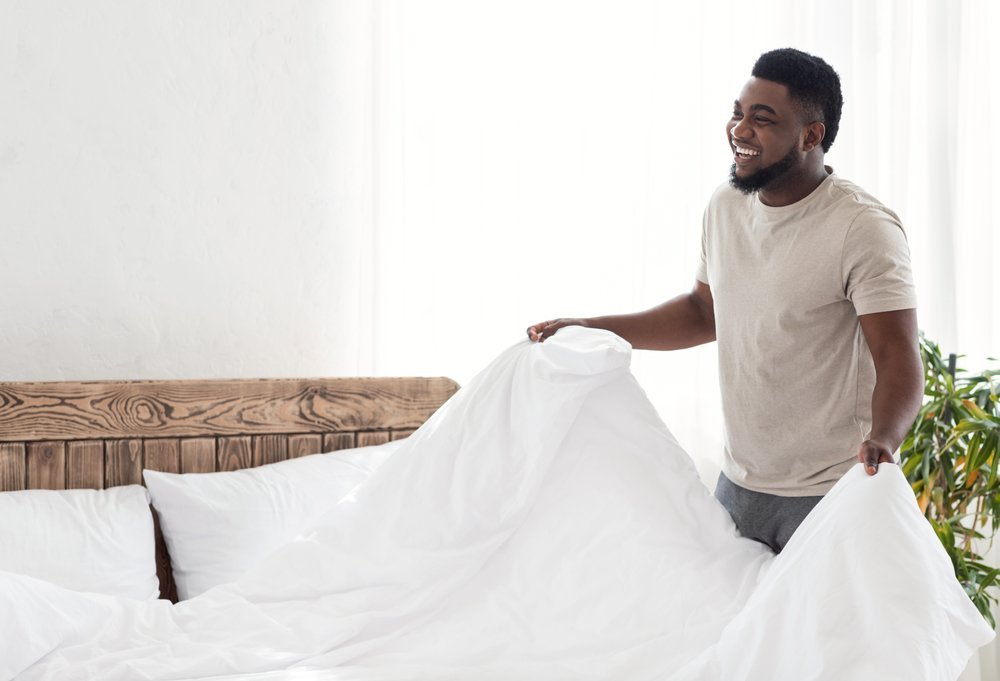Making your bed in the morning may seem like a trivial chore, but it's one that many of us don't bother with. But, as Dee Marques explains, taking just a few moments to make your bed could set you up mentally for the rest of the day – and beyond.
Many of us can probably remember one not-so-great memory from our childhoods: our parents instructing us to make our beds in the morning! Many years later, some adults still have mixed feelings about this habit.
In fact, making or not making the bed seems to be a controversial topic. In some ways, it even defines personalities; you may have heard the tongue-in-cheek expression that there are two types of people in the world – those who make their beds and those who don’t.
Of course, whether we make our bed or not is a personal choice, but, interestingly, it can have an impact on our mental well-being. So, which side of the bed-making debate do you lay on? If you're rushing to get to work or take the kids to school, tidying your sleeping space might be the last thing you want to do, but it turns out that taking a minute or two to do just that could have a positive impact on the rest of your day.
Why you should make your bed every day
Retired US admiral William McRaven once said that “if you want to change the world, start by making your bed”. He even wrote a book about it, the aptly entitled Make Your Bed. But McRaven isn’t the only well-known personality to extol the virtues of this orderly habit.
Canadian psychologist Jordan Peterson also said something along those lines when he wrote that one of the key rules for life is cleaning your room, which, of course, also includes making your bed. When reading these statements, you might wonder what does making your bed have to do with bringing change to the world?

Making your bed builds a foundation for other good habits
The short answer is that making your bed is a healthy habit that ensures you start your day with an accomplishment. Even if this specific task of bed-making seems small, it can make a big difference to your mindset for the rest of the day.
Indeed, your internal dialogue can go from “today I didn’t accomplish much, I didn’t even make my bed!”, to, “even if nothing else goes well today, at least I bothered to make my bed!”. In fact, good habits and the positive attitude they cause are the cornerstones of healthy change – which can start in your own bedroom.
Five reasons to make your bed daily
There are other benefits to making your bed every day, beyond the powerful impact on habits, daily structure and internal stability.
1. It encourages order and organization
There’s something visual about a made (or unmade) bed. The first transmits the idea of order, whereas the second does exactly the opposite. Living in a messy environment has been linked to some mental health conditions, like depression, and it could also suggest that a person is struggling to cope with problems or feeling overwhelmed.
On the other hand, psychologists believe that organization helps with stress reduction, and that disorganization can impair our ability to focus. The opposite is also true; making your bed is a step towards getting your room or house organized.
2. It improves self-confidence
Making your bed every day may seem trivial, but the action can serve as a reminder that you’re in control of at least one thing in your life. Like other habits, making your bed daily requires responsibility and commitment. Knowing that you can set your mind to something and persevere day after day can increase your personal satisfaction levels and improve your confidence in your own abilities.
“Making your bed every day may seem trivial, but the action can serve as a reminder that you’re in control of at least one thing. Like other habits, making your bed daily requires responsibility and commitment.”
This habit can be 'practice' for other tasks that may lie ahead and make you feel more confident about your ability to tackle them. There’s some pride in saying “I did this today”, or, “I took care of my immediate environment first thing in the morning”.
3. It can help you sleep better
Getting better sleep is essential to our mental and physical health, but there are lots of things that can interfere with restorative sleep. The brain controls part of the sleep cycle, so if it detects something uncomfortable, the quality of your sleep may be affected.
RELATED: 14 sleep hacks to get a good night's rest
That 'something' can be invisible (like worrying about something before heading to bed) or visible, like the tidy bed you made in the morning. The sight of a made-up bed can send a signal to the brain to make sleep more appealing and less vulnerable to disruption.

Making your bed every day could help you to sleep better shutterstock/Prostock-studio
4. It prepares you for bigger challenges
One of the reasons behind inaction or demotivation is skipping steps when goal setting. For example, someone who wants to start exercising can frame the goal as, “I want to work out every day”. But if they don’t start by exercising one or two days a week, the whole goal seems unattainable.
The same applies to making your bed. By doing this, you’re setting up the basis for adopting bigger goals or routines. And if you’re the type of person who resists the idea of making the bed every morning, knowing you can push past the resistance can prepare you for bigger challenges.
5. It's the foundation of other good habits
A survey with 68,000 participants found that people who made their beds daily felt more satisfied with life and felt better physically than those who didn’t. And while we can’t establish a direct causal link between making your bed and being happier, it can be a roundabout way to higher well-being.
“When making your bed becomes a daily habit, expect to see improvements in your organization skills, self-confidence and even your sleep quality.”
This is mostly because sticking to a productive habit makes it easier to develop other good habits. And the more good habits in our life, the more we are investing in our physical and mental health.
Some tips if you struggle making your bed daily
If you've decided to be more consistent in making your bed every day, you may face the typical resistance that is felt when adopting new habits. This can materialize in the form of excuses, low motivation, procrastinating, etc. Here are some tips to help you with that:
-
Start with a manageable and specific goal. If you're goal isn’t too overwhelming, you’re more likely to go through with it. For example, instead of saying “I will always make my bed”, start with “I’ll make my bed every day this week”.
-
Connect the new habit to an old habit. This is a useful of way of not conveniently 'forgetting' to make your bed when you’ve decided to do it every day. For example, if you shower every morning, leave the bath towel on your bed, so you’ll have no option but to see the unmade bed when you pick up the towel before showering.
-
Use a visual reminder, like a Post-it note on your mirror or on the kitchen cupboard. You could also set an alarm on your phone.
-
If you're still struggling, get help from a friend or family member. Just letting someone know of what you’re trying to do and asking them to check on you can improve accountability levels.
- Take 'failure' the smart way. If you don’t make your bed one day, don’t let it become an excuse for not doing it ever again. We all have setbacks when creating new habits. What matters is finding out what causes those setbacks and what we can learn to prevent them from happening again in the future.
Takeaway: making your bed
Making your bed is a positive habit that takes little effort once you push past the initial resistance. Indeed, when this becomes a daily habit, you can expect to see improvements in your organization skills, your self-confidence, your ability to create other good habits, and even your sleep quality – these are all fantastic benefits for something that only takes a couple of minutes of your day! •
Main image: shutterstock/Crime Art
happiness.com | The fine art of being: learn, practise, share
Are you a happiness.com member yet? Sign up free to:
■ enjoy our happiness magazine with practical life tips
■ share and support others in our happiness forum
■ self-develop with free online classes in our happiness Academy
Written by Dee Marques
 A social sciences graduate with a keen interest in languages, communication, and personal development strategies. Dee loves exercising, being out in nature, and discovering warm and sunny places where she can escape the winter.
A social sciences graduate with a keen interest in languages, communication, and personal development strategies. Dee loves exercising, being out in nature, and discovering warm and sunny places where she can escape the winter.



Join the conversation
You are posting as a guest. If you have an account, sign in now to post with your account.
There are no comments to display.